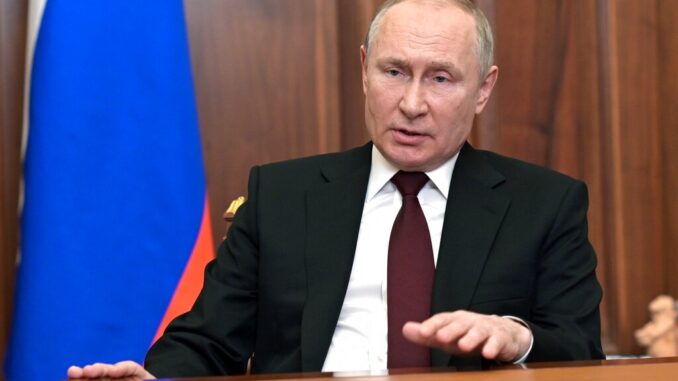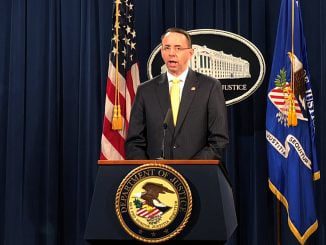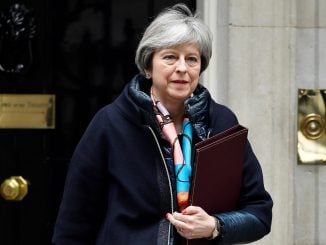
MOSCOW — Russian President President Vladimir Putin has recognized the independence of separatist regions in eastern Ukraine — a move that will severely ratchet up tensions with the West amid fears that his country could invade Ukraine at any moment and use skirmishes as a pretext for an attack.
Putin’s announcement comes after a meeting of the presidential Security Council and paves the way for Russia to openly send troops and weapons to the long-running conflict pitting Ukrainian forces against Moscow-backed rebels. A 2015 peace deal ended large-scale fighting, but violence has simmered and has seen a spike in recent weeks amid the wider crisis.
European leaders urged Putin to resist recognition, and the EU foreign policy chief threatened possible sanctions if he does. Ukraine’s president convened an emergency meeting of top security officials.
The Kremlin said Putin told the leaders of Germany and France that he would sign a “relevant decree” soon in response to the separatist leaders’ pleas to recognize their independence. It didn’t elaborate on what the decree would say.
According to the Kremlin, German Chancellor Olaf Scholz and French President Emmanuel Macron voiced “disappointment with such a development” but also “readiness to continue contacts.”
With an estimated 150,000 Russian troops massed on three sides of Ukraine, the U.S. has warned that Moscow has already decided to invade. Still, the American and Russian presidents tentatively agreed to a possible meeting in a last-ditch effort to avoid war.
If Russia moves in, the meeting will be off, but the prospect of a face-to-face summit resuscitated hopes that diplomacy could prevent a devastating conflict, which would result in massive casualties and huge economic damage across Europe, which is heavily dependent on Russian energy.
Earlier Monday, leaders of the regions released televised statements pleading with Putin to recognize them and sign treaties that would allow for military aid to protect them from what they described as an ongoing Ukrainian military offensive. Russia’s lower house of parliament made the same plea last week.
Ukrainian authorities deny launching an offensive and accuse Russia of provocation.
But the Kremlin initially signaled its reluctance to recognize the regions in eastern Ukraine, arguing that would effectively shatter the peace deal, which marked a major diplomatic coup for Moscow, requiring Ukrainian authorities to offer a broad self-rule to the rebel regions.
The deal was resented by many in Ukraine who saw it as a capitulation, a blow to the country’s integrity and a betrayal of national interests. Putin and other officials argued Monday that Ukrainian authorities have shown no appetite for implementing it.
With the prospect of war looming, French President Emmanuel Macron scrambled to broker a meeting between U.S. President Joe Biden and Putin, who denies he has any plans to attack Ukraine.
Russia says it wants Western guarantees that NATO won’t allow Ukraine and other former Soviet countries to join as members — and Putin said Monday a simple moratorium on Ukraine’s accession wouldn’t be enough. Moscow has also demanded the alliance halt weapons deployments to Ukraine and roll back its forces from Eastern Europe — demands flatly rejected by the West.
Macron’s office said both leaders had “accepted the principle of such a summit,” to be followed by a broader meeting that would include other “relevant stakeholders to discuss security and strategic stability in Europe.”
The language from Moscow and Washington was more cautious, but neither side denied a meeting is under discussion.
During the Kremlin meeting, several top officials spoke skeptically about a possible summit, saying it was unlikely to yield any results.
U.S. national security adviser Jake Sullivan, meanwhile, said the administration has always been ready to talk to avert a war — but was also prepared to respond to any attack.
“So when President Macron asked President Biden yesterday if he was prepared in principle to meet with President Putin, if Russia did not invade, of course President Biden said yes,” he told NBC’s “Today” show on Monday. “But every indication we see on the ground right now in terms of the disposition of Russian forces is that they are, in fact, getting prepared for a major attack on Ukraine.”
Since Thursday, shelling has spiked along the tense line of contact that separates Ukrainian forces and Russian-backed rebels in Ukraine’s eastern industrial heartland of Donbas. Over 14,000 people have been killed since conflict erupted there in 2014, shortly after Moscow annexed Ukraine’s Crimean Peninsula.
Ukraine and the separatist rebels have traded blame for massive cease-fire violations with hundreds of explosions recorded daily.
While Russia-backed separatists have charged that Ukrainian forces were firing on residential areas, Associated Press journalists reporting from several towns and villages in Ukrainian-held territory along the line of contact have not witnessed any notable escalation from the Ukrainian side and have documented signs of intensified shelling by the separatists that destroyed homes and ripped up roads.
Some residents of the main rebel-held city of Donetsk described sporadic shelling by Ukrainian forces, but they added that it wasn’t on the same scale as earlier in the conflict.
The separatist authorities said Monday that at least four civilians were killed by Ukrainian shelling over the past 24 hours and several others were wounded. Ukraine’s military said two Ukrainian soldiers were killed over the weekend, and another serviceman was wounded Monday.
Ukrainian military spokesman Pavlo Kovalchyuk said the separatists were “cynically firing from residential areas using civilians as shields.” He insisted that Ukrainian forces weren’t returning fire.
Amid the heightened invasion fears, the U.S. administration sent a letter to the United Nations human rights chief claiming that Moscow has compiled a list of Ukrainians to be killed or sent to detention camps after the invasion. The letter, first reported by the New York Times, was obtained by the AP.
Kremlin spokesman Dmitry Peskov said the claim was a lie and no such list exists.



